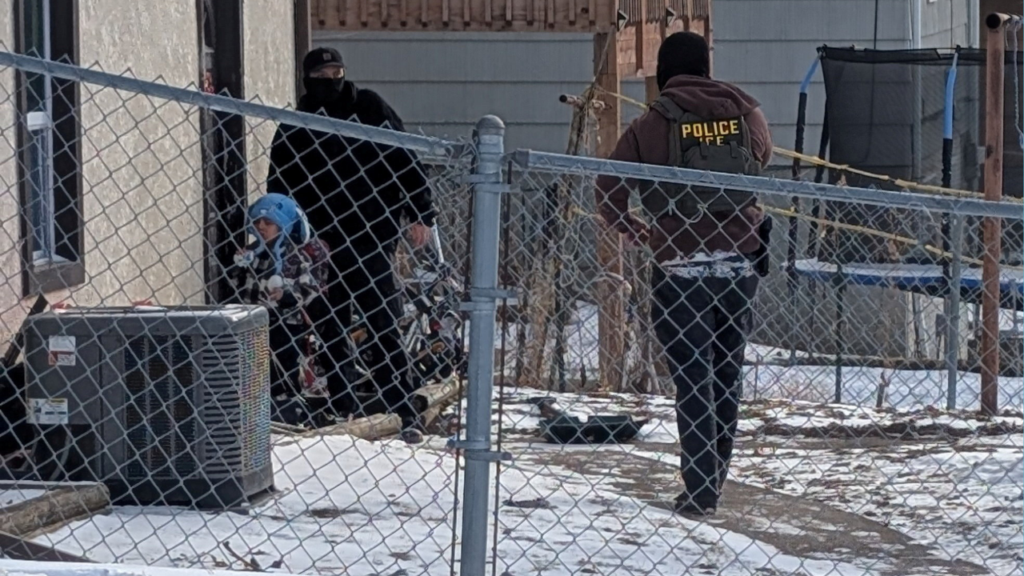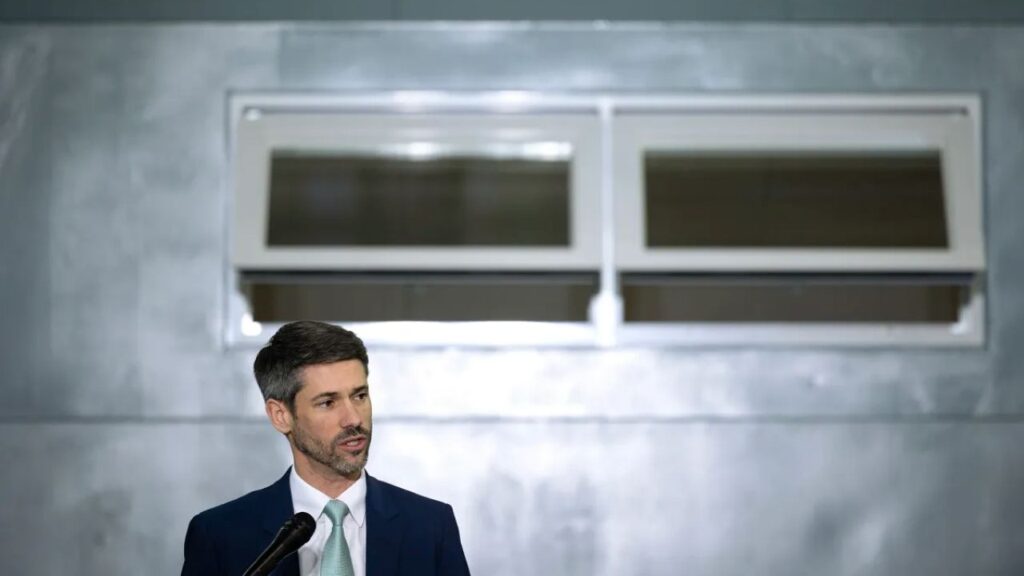Margie Jessen, CEO and founder of Forensic Nurse Specialists of Central CA, center, is shown with Diana Silvas, left, who is the organization’s president, and Sai Thao, vice president, right. The organization is spearheading a clinic in Merced that will conduct forensic medical exams for victims of sexual assault. (The Merced FOCUS)

- Merced has lacked facilities and staff to conduct forensic exams, or "rape kits," for over a decade.
- A local space for forensic exams is scheduled to open by Sept. 1, led by Forensic Nurse Specialists of Central CA.
- Long travel times and limited resources currently deter some survivors from agreeing to undergo forensic exams.
Share
|
Getting your Trinity Audio player ready...
|
In a city with a university, community college and a population approaching 100,000, survivors of sexual assault must travel around one hour to undergo a forensic medical exam.

Brianna Vaccari
The Merced FOCUS
The exam is a lengthy evidence collection process that’s key for treating and documenting medical conditions or injuries associated with the assault, in addition to gathering DNA to prosecute crimes.
For more than a decade, the city of Merced has lacked the facilities and staff needed to conduct the exam, more commonly known as a “rape kit.”
Currently, law enforcement officers or advocates accompany victims to the exam during a car ride that takes at least 45 minutes, either to Memorial Hospital in Los Banos – on the western edge of the county through a route known for dense and deadly fog – or to Fresno, which is in another county altogether.
That adds nearly two hours to the lengthy exam process after an already traumatizing experience.
Now, community leaders and field experts are working to bring to Merced a local space to perform the exams and meet patient needs.
“It’s a need in Merced. We know we can provide it, and we can provide it now,” said Margie Jessen, CEO and founder of Forensic Nurse Specialists of Central CA, the Clovis-based company leading the local effort to address victims’ needs and experiences during forensic medical exams.
Jessen said the Merced location is scheduled to open by Sept. 1. Her team will do exams primarily for women and children, but they also will do exams at local detention centers or for death investigations, she said.
What Is a Forensic Medical Exam?
A forensic medical exam takes three steps to complete. The exam is done on people, including children, who experience crimes such as sexual assault (which includes rape), domestic violence and human trafficking.
To begin the exam, a nurse first will conduct an assessment and interview the victim to find out what happened. This information will give the nurse a road map for evidence collection.
Evidence collection is the second part of the exam and includes swabbing for DNA, taking photos, and a physical examination. Often, victims are discouraged from changing out of their clothes, eating, drinking or using the bathroom before the exam to preserve evidence.
The last portion is discharge, which includes providing necessary antibiotics or medications the client may need. During discharge, an advocate often provides their client a snack or meal of some sort, as well as resources for mental health or follow-up medical services they may need.
In some cases, clients are asked to return a few days later so nurses can collect additional evidence, such as taking new photos of injuries or bruising.

Why Aren’t the Exams Done in Merced?
Merced appears to have lacked forensic exam services since around 2009, according to a Merced-Sun Star news story from 2015. At the time, county officials said Merced lacked the service for the past six years.
In the early 2000s, Jessen, a nurse with nearly three decades of experience performing forensic exams, opened a small operation in Merced County to perform the exams. But she struggled to keep staff in Merced while her business was flourishing in other Valley locations.
In 2015, Merced County’s Sexual Assault Response Team (SART) advisory committee put out a request for proposal to conduct the exams locally. Mercy Medical Center, Merced’s hospital, provided an exam room free of charge and donated basic equipment. Ultimately, no one responded to the RFP, according to the Sun-Star story.
Valley Crisis Center has been the primary service provider for victims of sexual assault, domestic violence and human trafficking in Merced County since 2008. The program originally began as a 24-hour crisis hotline based in Mariposa County in the 1990s. It expanded and evolved over the years, and now it also provides survivor advocates, emergency shelter, educational and intervention services.
But Valley Crisis Center doesn’t employ nurses who are trained and certified to do forensic medical exams, and it’s hard to find nurses who are available after hours if they already work a full-time job, said Jeremy Martinez, the executive director of Alliance for Community Transformation, the umbrella organization for Valley Crisis Center and its affiliated programs.
“It’s basically finding the human capital, the skills that we need, that workforce to do it,” Martinez said.
Plus, providing such a service requires collaboration between law enforcement, health facilities and service providers, he said.
Related Story: COVID-19 Test Sites Open in Dinuba, Porterville
‘More Traumatic’ for Victims
Not every person who experiences sexual violence reports it to any agency, let alone law enforcement. Of those who do report, not all will agree to a forensic exam.
By June, Merced Police Department had investigated 20 cases of sexual assault for the year, matching the year-to-date number from 2023, Chief Steven Stanfield said.
Merced College contracts with Valley Crisis Center to track the number of clients they see and the for services they provide, but there’s no tally for the number of clients who undergo a forensic exam.
Between January 2020 and May 2024, Valley Crisis Center saw more than 90 clients from Merced College. Seven clients reported experiencing multiple forms of sexual violence. Nearly 70% of clients reported intimate partner violence, and more than one third reported sexual assault.
UC Merced follows the Jeanne Clery Act reporting process for crimes, including sexual violence. The federal law requires colleges and universities to report campus crime data, support victims of violence, and publicly outline the policies and procedures they have put into place to improve campus safety.
The university’s latest report on campus safety and crime, published last year, accounted for crimes from 2020 to 2022. During that time frame, the university reported 23 instances of sexual assault, 17 instances of stalking, and four domestic or dating violence offenses.
Like the community college, UC Merced also have staff and resources available on campus to support people experiencing any form of sexual violence.
Last year, during a University of California Regents health services committee hearing, a systemwide Title IX administrator noted that UC Merced is the only UC campus located in a county with no certified facility where forensic medical exams are conducted.
Having a local facility in Merced for forensic medical exams would better serve survivors, said Daisy Castillo, Merced College’s campus advocate.
In her experience assisting survivors, the long drive deters Merced survivors from agreeing to a forensic exam, Castillo said. If someone does decide to move forward with the exam, the travel time to Los Banos or Fresno can add further challenges, she said.
Castillo recalled an incident that was disclosed at 3 p.m.. Between the travel time and exam time, she and her client didn’t get home until 3 a.m..
“That just makes an already unfortunate situation even more traumatic,” Castillo said.
“It is a barrier to go out of town,” she said. “It’s a barrier to worry about transportation or childcare, or missing work or missing school. It can even be intimidating to go out of town to get medical care. So having something here locally would make the process a bit easier.”
Stanfield, Merced’s police chief, worked for years as a special victims unit detective for the Modesto Police Department. The victims he worked with could seek a forensic exam at Memorial Medical Center.
Adding travel time and asking someone to retell their story revictimizes them, Stanfield said.
“When you make it challenging like that – when you make it as unfriendly and as uncaring and as uneasy as possible for a victim to be a victim – it’s like, ‘I don’t want to go through all that,'” he said. “You can’t pile trauma on the trauma.”
Related Story: Fresno Staffing Company Must Pay $500K in EEOC Sexual Harassment Settlement
What’s Being Done About It?
Merced County District Attorney Nicole Silveira is encouraging local law enforcement agencies to work with a private company to bring forensic medical exams to Merced. Mercy Medical Center is providing a secure facility and supplies, while the private company will provide the staff and expertise.
Jessen, the expert nurse, is working to bring her company to Merced and contract with local law enforcement agencies. On top of her years of experience and nursing license, Jessen also earned a doctorate and holds certifications as a psychiatric mental health and sexual assault nurse.

Nicole Silveira, Merced County District Attorney
Jessen later founded the nonprofit called Family Healing Center, a confidential, one-stop facility where victims can go for the forensic exam and seek support.
The center transformed the model for administering the exams throughout the Valley by using a victim-centered approach, rather than the traditional hospital-based approach. Victims with visible physical injuries often will avoid being seen in public spaces, such as an emergency room, or need privacy and security from whoever hurt them.
Jessen’s approach benefits everyone – survivors, law enforcement and the hospitals, she said.
“Every emergency room is busting at the seams, and these forensic exams could take anywhere from four to six, sometimes even eight hours, depending on the injuries,” Jessen said. “So that would tie up an emergency room nurse for a very long time.”
Having a local facility will also reduce the strain on law enforcement resources when officers accompany victims for the exams, Silveira said.
But ultimately, having a Merced location for victims to go to will reduce the harm they experience. “I would just hope that having someone here locally that could do it would provide more of an opportunity to get help to the survivors,” Silveira said.
Jessen complimented Silveira for making the facility happen. “Very seldom do we get elected officials pushing for something like this to go through,” Jessen said.
Related Story: Dinuba Man Faces Sexual Assault Charges, More Victims Possible
Long-Term Solutions
Jessen said her team will start slowly in Merced before opening a full-service center like the one in Fresno. For that to happen, she hopes to see long-term commitments from each law enforcement agency in Merced County.
Martinez with the Alliance hopes Valley Crisis Center will one day have enough funding to provide the exams as well out of one central location where clients can access all of the center’s services in one location.
Valley Crisis Center and the Alliance rely in large part on funding from the federal Victims of Crime Act, which generates money through prosecuting white-collar crimes in federal court. In recent years, that funding has sharply decreased as prosecutions wane.
Martinez hopes local government agencies will step up to fund services for survivors, particularly for forensic medical exams.
“How many local governments say, ‘Oh, we don’t need California to tell us what to do. We’ll take care of ourselves.’ Here’s your opportunity,” Martinez said.
Resources
If you have experienced sexual assault, domestic violence or human trafficking, you are not alone, and help is available.
If you need emergency medical attention, call 911.
To speak to an advocate about other resources, call the Valley Crisis Center’s 24/7 crisis hotline at 209-722-4357. You can also visit valleycrisiscenter.org.
Merced College students and staff at the Merced and Los Banos campuses can find information about their campus advocate and resources at the campus’ student support page: www.mccd.edu/student-support/.Click on the Relationship and Sexual Violence Prevention link to get help.
UC Merced students and staff can find information about their campus resources at ophd.ucmerced.edu.
About the Author
Brianna is the accountability and government watchdog reporter for the Central Valley Journalism Collaborative.


















